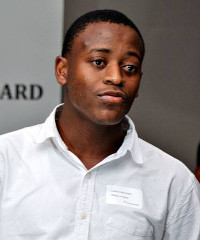When South African Ludwick Marishane was 17 years old, he had a school friend who was too lazy to bath. This sparked an idea: what if there was a way of cleaning oneself without actually bathing?
Marishane imagined a lotion that could be applied to the body as a replacement for bathing, but assumed it already existed.
“So I did some research and realised this product wasn’t out there. I spent a couple of months researching different lotions, creams, hand sanitisers, how they were made, etc., and then formulated it. I had a formula on paper, but I didn’t have the resources to make it yet,” he told How we made it in Africa.
Before completing his final year of high school, Marishane drew up a business plan and patented the formula, making him South Africa’s youngest patent holder. He had taught himself how to patent formulas two years earlier when developing his business idea for a healthy cigarette.
After high school, Marishane received a scholarship to study at the University of Cape Town (UCT) where he used the resources available to continue developing his idea. His business plan won third place in a competition in his first year at UCT and he used the prize money to create a sample of his product to see if it worked.
“It didn’t work as well as I thought,” he explained, adding that it would remove the body odour but would flake on the skin after the gel dried, looking unsightly.
Marishane then brought in Dr Hennie du Plessis, a chemical engineer with experience in developing personal care products, who improved the formula and resolved the problems. Du Plessis is now a shareholder and product manager of Headboy Industries, Marishane’s company behind DryBath.
In 2011, Marishane was selected as one of the finalists for the Anzisha Prize, a competition that recognises entrepreneursacross the African continent between the ages of 15 and 22 who are solving problems in their communities. Last year Time magazine named him as one of its top 30 people under the age of 30 who are changing the world.
Defining the market
“When we created DryBath we basically just wanted to create a bath-substituting product that was simple and didn’t need any water at all… So we first had to study cleanliness and what it means to be clean. We found some very interesting research. What came out is that most people determine whether or not they are clean based on how they smell. That was the biggest indicator on whether or not a person felt clean.”
Originally, Marishane thought his product would find a market for those who did not have the time to bath, or wanted to save on water or electricity costs, particularly black South Africans. However, his research found that “black people had a psychological attachment to bathing because of their socio-economic backgrounds” and the perception that a hot water bath showed a progression in their economic status.
Headboy Industries also received proposals for bulk purchases of DryBath to cater to poverty-stricken areas in Africa and Asia where clean water is scarce. But the company is unable to manufacture the lotion for the price these markets are willing to pay.
“As a young startup that was just not viable for us,” explained Marishane.
However, DryBath has found a profitable market in people participating in outdoor activities such as camping, travelling and attending festivals, and currently exports 90% of its product overseas, mostly to Europe and the US.
Business is a hustle
“The biggest challenge I see with young entrepreneurs is not the funding, the networks or even the skill, but the problem with people not sitting down and doing the research,” said Marishane, adding that he often receives emails from young people who have business ideas and want to know what their next step should be without actually trying to figure it out themselves.
He noted that entrepreneurship is not just about having a business idea, but about putting in the effort to bring the idea to life. For example, Marishane taught himself how to patent a formula back when he was developing the idea for a healthy cigarette.
“I did months of research on that in order to figure out what the next steps were… and the research was what guided me.”
When he realised he needed the assistance of a professional who could provide him with patent information he couldn’t access, Marishane contacted a lawyer for guidance.
“And I think to this day the only reason a professional like him – who had never met me – decided to help me at that stage in time was because I showed him evidence of how much work I had managed to do, and tried to do, on my own. It wasn’t a lazy, ‘please [do a patent] search for me because I’m too lazy to try and do it myself’. I searched everywhere that I could, and he had access to data bases that I didn’t.”
Two years later, while patenting DryBath, the same lawyer was willing to help because he could see that Marishane had put in the time and effort.
“I had already written the patent documents myself at the age of 17. I think that as a professional who studied not only his degree of engineering but also two years in IP (intellectual property) law, he also appreciated the level of effort that had been shown by someone that young.”
Alongside the importance of having a capable team, Marishane (now 24) said he has also learnt that business is a hustle.
“It doesn’t matter if you are Apple, Google or a small time guy literally trying to make T-shirts in the township. Every business is a hustle. People don’t really realise that we have all gone through days where we literally have to package our product at home, at night, with our girlfriends, etc… So it’s a hustle.”

Comments
Post a Comment